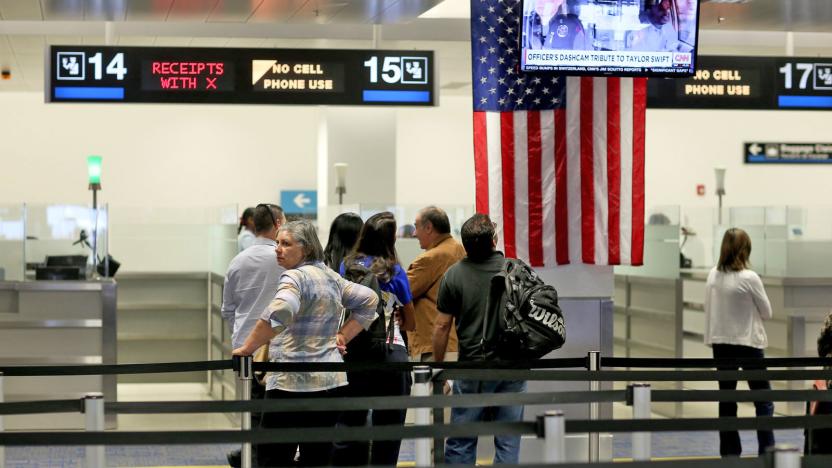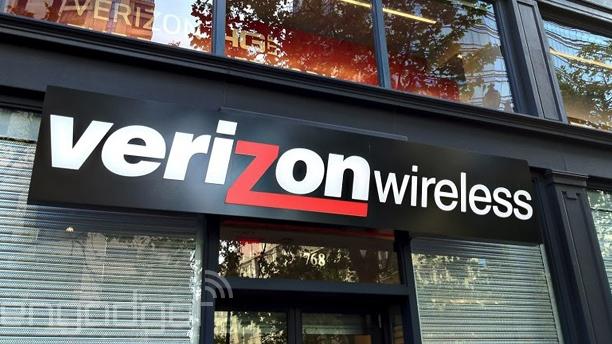FourthAmendment
Latest

Court rules accessing smart meter data constitutes a government search
Smart meters are designed to reduce energy consumption, lower household bills and, by extension, help the planet along a little bit. But could they also be used by the government to spy on you? This is the question that was thrown into the spotlight this week when the Seventh Circuit handed down a landmark opinion ruling, stating that data collected by smart meters is protected by the Fourth Amendment.

Senators propose reforms to wide-reaching surveillance law
Eleven senators -- both Republican and Democrat -- introduced new legislation today that calls for substantial reforms to Section 702 of the Foreign Intelligence Surveillance Act, Reuters reports. Section 702 allows intelligence agencies to monitor the communications of foreign targets living outside of the US, but it also enables those agencies to collect information on US citizens if they happen to be in communication with the non citizens being monitored.

Court rules Stingray use without a warrant violates Fourth Amendment
Today, the Washington DC Court of Appeals overturned a Superior Court conviction of a man who was located by police using a cell-site simulator, or Stingray, CBS News reports. The court ruled that the defendant's Fourth Amendment rights were violated when law enforcement tracked down the suspect using his own cell phone without a warrant.

Senate bill would require a warrant for border phone searches
Did US border agents insist on searching the contents of your smartphone during your latest trip, privacy be damned? You're not alone -- Homeland Security has revealed that searches by Customs and Border Protection are surging, growing from under 5,000 in all of 2015 to 5,000 just this February. However, there might soon be legislation that keeps these searches in check. Oregon Senator Ron Wyden is preparing a bill that would not only require a warrant before border officials can search the devices of US citizens, but strictly forbid them from asking for passwords. They'd need a legitimate reason to believe your phone holds something shady, not just a hunch.

FBI allegedly paid Geek Squad for evidence
Last May, the defense in a child pornography trial alleged that the FBI used a member of electronics retailer Best Buy's tech support team, Geek Squad, to peer into the accused's computer on the hunt for evidence of child pornography. Since then, the defense's lawyers revealed that the FBI had cultivated at least eight of the company's IT handyfolk over a four-year period to serve as confidential informants, who all received some payment for turning over data. Obviously, this raises serious questions about whether sending devices into the repair shop forfeits a person's right to privacy or unreasonable search and seizure.

Researchers develop a drug-sniffing car that can pinpoint your stash
A chemistry professor in Texas has equipped an electric Ford sedan with a unique (and possibly unconstitutional) aftermarket upgrade: a drug-sniffing device that can recognize small amounts of illegal substances in the air and locate the source with surprising accuracy.

US government says online storage isn't protected by the Fourth Amendment
A couple months ago, a New York judge ruled that US search warrants applied to digital information even if they were stored overseas. The decision came about as part of an effort to dig up a Microsoft user's account information stored on a server in Dublin, Ireland. Microsoft responded to the ruling and challenged it, stating that the government's longstanding views of digital content on foreign servers are wrong, and that the protections applied to physical materials should be extended to digital content. In briefs filed last week, however, the US government countered. It states that according to the Stored Communications Act (SCA), content stored online simply do not have the same Fourth Amendment protections as physical data: Overseas records must be disclosed domestically when a valid subpoena, order, or warrant compels their production. The disclosure of records under such circumstances has never been considered tantamount to a physical search under Fourth Amendment principles, and Microsoft is mistaken to argue that the SCA provides for an overseas search here. As there is no overseas search or seizure, Microsoft's reliance on principles of extra-territoriality and comity falls wide of the mark.

Verizon fought the NSA's metadata collection program but lost anyway
It looks like Verizon's concerns about government snooping go beyond publishing transparency reports -- but also haven't had much of a tangible effect. The Washington Post understands through both a declassified ruling and sources that Big Red quietly challenged the constitutionality of the NSA's call metadata collection in January, only to be shot down by the Foreign Intelligence Surveillance Court in March.

Supreme Court to determine if police need warrants to search cellphones
It's now clear that police don't need a warrant to track your cellphone, but searching that phone is another matter; there's no obvious guiding policy. Any murkiness may be settled soon, as the Supreme Court has agreed to rule on two cases where the accused have objected to cops obtaining evidence from their phones without warrants. Decisions in either case could set precedents for searches across the US; if judges determine that warrants are necessary, they could challenge guidelines in California and other places that allow warrantless searches after arrests. The court hasn't scheduled the relevant hearings, though, so it may be a while before there are any definitive answers. [Image credit: Erin Nekervis, Flickr]

DOJ declines to reveal policy memos on GPS tracking
The US Supreme Court might have ruled last year that GPS tracking is equivalent to a search, but that doesn't mean the government's practices are transparent. If anything, they may be more opaque than ever. The Department of Justice has responded to an ACLU Freedom of Information Act request for a pair of GPS tracking policy memos by providing almost completely redacted versions that, effectively, say nothing. Not surprisingly, the ACLU isn't satisfied -- it's worried that the government is playing fast and loose with definitions of where GPS tracking is usable, and when it requires a warrant under the Fourth Amendment. Whether or not the allegations are true, the civil liberty advocates are going through the courts to push for more access; we may know the truth before too long. [Image credit: Frédéric Bisson, Flickr]

Judge rules Facebook users can share friends' profiles with the feds
It's not the backdoor access that the FBI has been pushing for, but US District Judge William Pauley III has now ruled that it and other law enforcement agencies are entitled to view your Facebook profile if one of your "friends" gives them permission to do so. As GigaOm reports, that ruling comes as part of a New York City racketeering trial, in which one of the accused, Melvin Colon, had tried to suppress evidence turned up on Facebook that led to his indictment. That information was obtained through an informant who gave investigators access to the profile, something that Colon had argued violated his rights against unreasonable searches and seizures under the Fourth Amendment. In the ruling, Judge Pauley dismissed that claim, likening the Facebook access instead to a phone wiretap in which one person on the call allows the government to monitor it -- a practice that has been ruled constitutional. GigaOm also has the ruling in its entirety at the source link below for those interested.

Sixth Circuit rules that law enforcement doesn't need a warrant to track your phone
If you go through tin foil like there's no tomorrow (or because you think there's no tomorrow), you might want to head down the store. A recent 2 - 1 ruling by the Sixth Circuit Court of Appeals has determined that law enforcement agencies can obtain cellphone location data, without the need for a warrant. The decision comes after a defendant in a drug-related case claimed protection from his phone's GPS location data being used under the Fourth Amendment. Judge John Rogers stated that the defendant didn't have a reasonable expectation of privacy for data given off by a voluntarily purchased phone, going on to state that if tools used in such crimes give off a trackable signal, police should be allowed to use it. Rogers likened it to the use of dogs tracking a scent, and criminals complaining they didn't know they were giving one off, or that the dog had picked it up. The use of technology in crime prevention, be it police tools, or that belonging to the greater population, has long been a source of complex discussion, and this latest development is unlikely to be the end of it. But for now, at least one guy is rueing his decision to get a better phone. Hit the source for the full case history.

FBI deactivates about 3,000 GPS tracking devices, loses sight of your car
Following a January ruling by the US Supreme Court, the FBI has deactivated some 3,000 GPS units that were potentially infringing on the Fourth Amendment. The decision seems to be making waves in the U.S. Justice Department. Andrew Weissmann, FBI General Counsel, says some of the devices have been difficult to retrieve, as the vehicles they were once tracking now move undetected. The FBI has sought temporary permission to reactivate some of the devices to locate and retrieve the hardware. Weissmann says the FBI is also developing new guidelines regarding the legality of its agent's actions -- from the application and use of tracking devices, to the extent a suspect's garbage can be searched before the agent is committing trespass. In short, the FBI is working really hard not to violate your legal right to privacy. If you happen to find something weird under you car, give 'em a call. They'd probably like it back.

Hawaii's proposed online tracking law comes under fire from ISPs, civil libertarians
There may be some trouble brewing in paradise, thanks to a seemingly draconian law currently under consideration in Hawaii's state legislature. If passed, H.B. 2288 would require all ISPs within the state to track and store information on their customers, including details on every website they visit, as well as their own names and addresses. The measure, introduced on Friday, also calls for this information to be recorded on each customer's digital file and stored for a full two years. Perhaps most troubling is the fact that the bill includes virtually no restrictions on how ISPs can use (read: "sell") this information, nor does it specify whether law enforcement authorities would need a court order to obtain a user's dossier from an ISP. And, because it applies to any firm that "provides access to the Internet," the law could conceivably be expanded to include not just service providers, but internet cafes, hotels or other businesses. Democratic Representative John Mizuno is the lead sponsor of the bill, though his support already seems to be waning. Not long after H.B. 2288 was introduced, Republican Representative Kymberly Pine told CNET that she would be withdrawing her support for it, adding that her intent was not to track Hawaiian web surfing, but to simply protect "victims of crime." "We do not want to know where everyone goes on the Internet," Pine explained. "That's not our interest. We just want the ability for law enforcement to be able to capture the activities of crime." Pine went on to acknowledge that the proposal has come under fire from many civil libertarians and internet companies within the state, and that the measure will likely be revised. In retrospect, she said, the concept of storing personal information "was a little broad," and Hawaii's lawmakers "deserved" the criticism they received during today's hearing.

Supreme Court says police must get search warrant to use GPS tracking devices
The US Supreme Court ruled today that police must first obtain a search warrant before using GPS devices to track a suspect's vehicle, agreeing with an earlier appeals court ruling but rejecting the Obama administration's position on the case. In delivering the decision, Justice Antonin Scalia wrote that the court holds "that the government's installation of a GPS device on a target's vehicle, and its use of that device to monitor the vehicle's movements, constitutes a 'search,'" and therefore violated the individual's Fourth Amendment rights. The case itself concerned a Washington DC nightclub owner and suspected drug dealer, Antoine Jones, who had his car's movements monitored for a month and was eventually sentenced to life in prison, only to see that conviction overturned by the aforementioned appeals court on the grounds that the police did not have a search warrant when they placed the GPS tracking device on his vehicle.[Image courtesy Wired]

Texas judge says warrantless cellphone tracking violates Fourth Amendment, saga continues
Rev up the bureaucratic turbines, because a judge in Texas has determined that warrantless cellphone tracking is indeed unconstitutional. In a brief decision issued earlier this month, US District Judge Lynn N. Hughes of the Southern District of Texas argued that seizing cellphone records without a search warrant constitutes a violation of the Fourth Amendment. "The records would show the date, time, called number, and location of the telephone when the call was made," Judge Hughes wrote in the ruling, linked below. "These data are constitutionally protected from this intrusion." The decision comes in response to an earlier ruling issued last year by Magistrate Judge Stephen Smith, also of the Southern District of Texas. In that case, Judge Smith argued against unwarranted wiretapping on similarly constitutional grounds, pointing out that with today's tracking technology, every aspect of a suspect's life could be "imperceptibly captured, compiled, and retrieved from a digital dossier somewhere in a computer cloud." The federal government appealed Judge Smith's ruling on the grounds that the Fourth Amendment would not apply to cellphone tracking, because "a customer has no privacy interest in business records held by a cell phone provider, as they are not the customer's private papers." Judge Hughes' decision, however, effectively overrules this appeal. "When the government requests records from cellular services, data disclosing the location of the telephone at the time of particular calls may be acquired only by a warrant issued on probable cause," Judge Hughes wrote. "The standard under [today's law] is below that required by the Constitution." The law in question, of course, is the Stored Communications Act -- a law bundled under the Electronic Communications Privacy Act of 1986, which allows investigators to obtain electronic records without a warrant. This month's decision implicitly calls for this law to be reconsidered or revised, though it's certainly not the only ruling to challenge it, and it likely won't be the last, either.

DoJ: Stingray cellphone tracking device falls under Fourth Amendment, but don't ask about it
In 2008, federal authorities arrested David Daniel Rigmaiden on charges of spearheading a massive identity theft ring in Arizona. Rigmaiden allegedly led this operation from January 2005 to April 2008, harvesting some $4 million off of more than 1,900 fraudulent tax returns. He was ultimately nabbed, however, thanks in part to controversial, and somewhat mysterious tool known as a "stingray" -- a device that effectively acts as a fake cell tower, allowing authorities to locate and track a cellphone even when it's not being used to place a call. Since his arrest, the 30-year-old Rigmaiden has been battling the feds in the U.S. District Court of Arizona, on allegations that their tracking tactics constituted an unlawful search and seizure, thereby violating his Fourth Amendment rights. For more than a year, the Department of Justice has maintained that the use of stingrays does not violate the Fourth Amendment. When it comes to sending data from a mobile device, the DoJ has argued, users should not have a "reasonable expectation" of privacy. Recently, though, the judge overseeing the case has indicated that he will press the feds for more information on how stingrays actually work -- something the government clearly has no desire to disclose. Prosecutors are so reluctant, in fact, that they may be willing to sacrifice their case against Rigmaiden in order to safeguard the stingray's secrecy. Read more about the latest developments, after the break.

New York judge denies government warrant for Verizon location data
Beating the man at his own game on Monday, a federal judge from the Eastern District of New York denied the US government's application asking Verizon Wireless to hand over 113 days of customer location data. Washington has long debated whether or not the Constitution protects modern day communications that include a third party (like cell phone conversations supported by a carrier company), and non-conversational meta data (like cellular GPS location data). Some say that buying a cell phone and using a carrier's services waives one's privacy rights in that data, while others claim we have a reasonable expectation of privacy in such info under the Fourth Amendment. In making his decision, Judge Nicholas Garaufis held that "the fiction that the vast majority of the American population consents to warrantless government access to the records of a significant share of their movements by 'choosing' to carry a cell phone must be rejected." As communications tech continues to change, these questions will likely be revisited. That's why Judge Garaufis went on to say that "in light of drastic developments in technology, the Fourth Amendment doctrine must evolve to preserve cell-phone user's reasonable expectation of privacy in cumulative cell-site-location records." Get the full opinion by clicking the source below.

Sixth Circuit rules that the government needs a warrant to search your email
Score another baby step for digital democracy: the Sixth Circuit Court of Appeals ruled today that the government must have a search warrant before it can obtain email from your provider. Specifically, the court held in U.S. v Warshak that "it would defy common sense to afford emails lesser Fourth Amendment protection" than traditional communications like phone calls and postal mail. Yes, you'd think that would be obvious, but the specific question had never actually been raised at the appellate level before, so the decision is critically important -- it's likely that other courts will take their cue from the Sixth Circuit when faced with similar issues. As the EFF points out, however, there are several legal exceptions to the warrant requirement in the Stored Communication Act that the organization is still fighting to have amended, but hey -- we'll take every little bit of progress we can.

Court reaffirms: fourth amendment rights not violated if the police install a GPS device on your car when it's not in your garage
Back in January, a court in Portland, Oregon ruled that the Fourth Amendment rights of one Juan Pineda-Moreno had not been violated by the police when they tracked him using various GPS devices they installed on the underside of his Jeep with magnets. You see, the police suspected that Pineda-Moreno was growing Marijuana somewhere, and they really didn't like that. Eventually, Pineda-Moreno was arrested and convicted of crimes involving the growth of said Marijuana -- but he appealed the decision because he thought that his Fourth Amendment rights (the one which guards against unreasonable search and seizure) had been violated. The appeals court has recently upheld the original decision, but there were five dissenting votes, meaning that the case is anything but cut and dried. Now, what's obvious is that the police didn't have to traverse into "private" space to attach the tracking device to the suspect's car, but clearly it's debatable -- even as far as the judges are concerned -- what constitutes private and public space. The case is surely not going to end here, so we'll keep you updated. In the meantime, watch your back.









